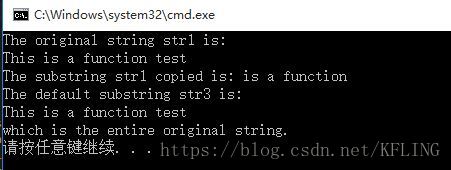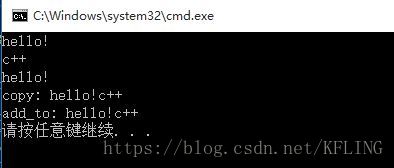最近写程序中用到这几个函数,下面将这几个函数的用法总结如下:
1.atoi函数。
功能:将字符串转换成长整型数。
用法:int atoi(const char *nptr)
示例代码如下:
#include <stdio.h>
#include <stdlib.h>
//atoi函数是把字符串转换成长整形数。用法是: int atoi(const char *nptr)
int main()
{
int n;
char *str = "12345.67";
n = atoi(str);
printf("string = %s integer = %d\n", str, n);
return 0;
}
此时输出为:
string = 12345.67 integer = 12345.
2.substr函数。
功能:复制子字符串,要求从指定位置开始,并具有指定的长度。如果没有指定长度或者超出了源字符串的长度,
则子字符串将延续到源字符串的结尾。
用法:basic_string::substr(size_type _Off=0, size_type _Count = npos) const;
参数说明:_Off ---所需子字符串的起始位置。字符串中第一个字符的索引为0,默认值是0.
_Count ---复制的字符数目。
返回值:返回一个子字符串,从指定位置开始。
代码示例:
#include<string>
#include<iostream>
using namespace std;
int main()
{
string str1("This is a function test");
cout << "The original string str1 is:" << endl;
cout << str1 << endl;
basic_string<char>str2 = str1.substr(5, 13);
cout << "The substring str1 copied is: " << str2 << endl;
basic_string<char>str3 = str1.substr();
cout << "The default substring str3 is:" << endl;
cout << str3 << endl;
cout << "which is the entire original string." << endl;
return 0;
}
输出为:
3.c_str函数。
功能:它是String类中的一个函数,它返回当前字符串的首字符地址。
标准头文件
当调用库函数时,客户程序提供的是string类型参数,而库函数内部实现用的是c-串。
因此需要将string对象,转化为char对象,c_str就提供了这样一种方法。它返回const char的指向字符数组的指针。
代码示例:
#include <iostream>
#include <string>
using namespace std;
int main()
{
string add_to = "hello!";
const string add_on = "c++";
const char *cfirst = add_to.c_str();
cout << cfirst << endl;
const char *csecond = add_on.c_str();
cout << csecond << endl;
char *copy = new char[strlen(cfirst) + strlen(csecond) + 1];
strcpy(copy, cfirst);//复制字符串
cout << copy << endl;
strcat(copy, csecond);//字符串连接
add_to = copy;
cout << "copy: " << copy << endl;
delete[] copy;
cout << "add_to: " << add_to << endl;
return 0;
}
输出:
https://blog.csdn.net/KFLING/article/details/79704754
如果文章或资源对您有帮助,欢迎打赏作者。一路走来,感谢有您!
 支付宝打赏
支付宝打赏
 微信打赏
微信打赏

txttool.com 说一段 esp56物联 查询128 IP查询